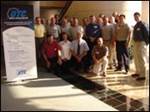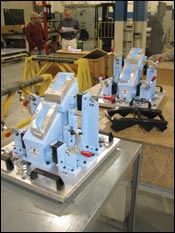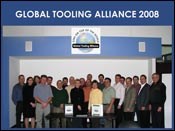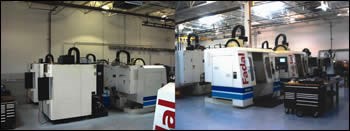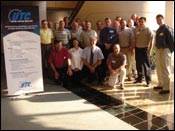Aligning Efforts in the Automotive Industry
Forming a strategic alliance allows this group of moldmakers to pool their resources and offer OEMs complete support—all the while realizing tax savings.
Share
Although the automotive market has been losing business to foreign competition—and thus forcing many moldmakers out of business—forming an alliance can be a method to keep manufacturing in the United States while affording its members much-needed tax savings. The Global Tooling Alliance was formed just for that reason.
According to Joseph Mandeville, owner of Elite Mold & Engineering Inc. (Shelby Township, MI), the name Global Tooling Alliance reflects how the automotive industry has changed and is no longer contained to the Motor City. “It is very much a global automotive industry,” Mandeville states. “As the U.S. automotive OEMs expand to the growing global markets, our alliance is ready to support their efforts in North America, Europe and Asia. Unlike a small business that stands alone and has limited resources, with a working alliance we can offer the total resources of all of our members.”
The alliance’s services include metal die stamping, plastic injection molds, compression molds, gage making, testing equipment, custom machinery, robotics integration, material handling, assembly equipment, checking fixtures, 3-D laser scanning, and special cutting tools.
A Joint Effort
Mandeville of Elite Mold & Engineering wanted to form a coalition so his company could take the next step in becoming a global supplier. “I saw that the automotive industry was spreading across North America,” Mandeville recalls. “Assembly plants have moved from the Midwest to Canada, Mexico and throughout the United States. As manufacturing continued to spread to China and Eastern Europe, we knew that our company needed to be a global supplier.” More than five years ago, we began managing 80 percent of our production tool building in China. This allowed us to focus our tool manufacturing on the low-volume injection mold market and the very fast-paced rapid plastic injection molds market—which required us to build tools in three, five, 10 and 15 days.
“Low-cost Asian tooling also made it easy to continue to grow our high production injection molding plant, Elite Plastic Products Inc.,” Mandeville continues. “Our production tool build management also is there to assist our customers that want Asian tooling that they can ship to Mexico for injection molding close to their assembly plant.”
Mandeville sought assistance to form the Global Tooling Alliance, which was formed within the requirements of the Michigan Tool & Die Renaissance Recovery Zone Act, a tax relief effort (visit http://medc.michigan.org/services/sitedevelopment/renzone/
toolanddierecovery/index.asp for more information). “The alliance was setup by Margaret O’Riley of O’Riley Consulting, a company that specializes in setting up these type of alliances,” Mandeville says. “With the help of Butzel Long Attorney-At-Law, the Global Tooling Alliance was set up as an L.L.C. during the summer of 2007. As an alliance, they can offer complete manufacturing and technical help in all key areas involved in the manufacturing of automobiles. They are able to handle larger projects and support customers in the international market.”
The alliance consists of 16 companies in the tooling industry; and each company has one voting member within the alliance. The members set the alliance’s policy, goals and objectives for the organization’s future. Mandeville notes that one of the biggest values the alliance affords is the ability to share resources in order to meet customer demands of pricing and timing.
“In a world where manufacturing must remain mean and lean, there is no benefit to having surplus capacity,” Mandeville explains. “The alliance can be used as support capacity to service the customer that has a large order or a very short leadtime. Within our alliance members have numerous core competencies, which add to our value as we can support customer activities in many areas—ranging from prototype to production.”
Knowledge and Networking
Learning to do business on an international scale can be very costly for a small business, Mandeville maintains. “With our tooling alliance, the cost of learning is shared,” he notes. “To speed up this learning process the alliance also uses the resources of Automation Alley—a Southeast Michigan Technology Center. With more than 800 members ‘The Alley’ has proven to be a great place in the Detroit area to obtain knowledge and networking for international businesses.”
According to Michael V. Marston, Corporate Counsel, Ronart Industries, Inc. (Detroit, MI), Ronart joined the coalition to learn of new ways to generate profit. “The current environment in the tool and die business requires that we learn new ways to compete and be profitable,” Marston explains. “The Recovery Zone legislation requires that we collaborate not only on sales and marketing, but also in developing standardized processes, tooling standards, standardized project management methods and improving the ability for specialized or small niche shops to develop expertise and compete on larger programs. The rate of change within our industry during recent years with the introduction of new technologies and processes is overwhelming. All of us need all of the help we can get.”
Pat Riley, President of Exceptional Mold & Engineering, Inc. (Romeo, MI) says joining the coalition allowed his company to take advantage of the tax savings. “We were granted a 15-year resolution from the Village Of Romeo, MI, designating us as a renaissance recovery zone,” Riley explains. “We will receive a tax abatement on our real estate and personal property taxes, along with the Michigan Business Tax for a period of 12 years, gradually phasing back in over the final three years. While the tax savings we will realize will be helpful, it will not even come close to putting us on an even footing with our low wage competition overseas.”
For Douglas Bachan, President of Maple Mold Technologies, Inc. (Rochester Hills, MI), the tax savings also is what initially drew him to the coalition. He soon realized another important benefit in networking. “I learned about several potential customers that I intended to solicit for business and found they do not pay their bills,” Bachan notes.
Networking also is important to Denis Boissonneault, president of Wright-K Technology, Inc. (Saginaw, MI). “Other companies can put you in contact with potential new business opportunities that we may not have had any knowledge or contact with,” he says. “It is still early in the formation of this group and we are just beginning to learn about one another and what each company has to offer. We plan to start holding our monthly meetings at members’ facilities to learn about each member’s business.”
Gary Kimmen, President of Top Craft Tool Inc. (Clinton Township, MI), also points out the advantages of sharing best practices. “One of the other benefits is to share and perform work through networking to get more business for our company,” he notes.
Mike Borg, controller of Century Tool and Gage (Fenton, MI)) adds that “this collaborative will help us further our networking resources to help increase our productivity.”
United Goals
United as a group, the Global Tool Alliance is working toward a number of goals. Its most pressing goal is to get information out to potential customers. “By networking together, explaining the alliance to current customers, marketing as a group and attending trade shows we will grow closer and stronger,” Mandeville of Elite Mold & Engineering emphasizes. “Our goal is to be a total service and solution provider.”
Expanding on these thoughts is Riley of Exceptional Mold & Engineering. “Being part of a larger group may provide several opportunities to reduce our costs,” he notes. “We could benefit from increased purchasing power as a whole and for common resources purchased amongst the member companies—such raw materials, components, office supplies, workers compensation and liability insurances, and possibly even health insurance. In addition, for the companies within our group who perform the same type of work, there may be outsourcing opportunities within the group, in cases where over-capacity issues arise.”
Bachan of Maple Mold Technologies wants to “interact with as many of the group as feasible in business opportunities and methods to incorporate lean systems.” As for the company’s future, he’d like to establish exports of Maple Mold’s products and increase the equipment base at the facility that the tax savings will assist in.
On the Future
Ronart’s Marston sums things up nicely. “In the future, I expect to see more detailed meetings amongst collaborative members focusing on various areas which we will identify and where we can share our expertise on particular matters so that all of us will raise our level of knowledge and performance,” he emphasizes. “The goal—as in everything we do—is to continuously improve, and with more players in the game we should reach our current goals more rapidly and generate new goals for the future.”
Related Content
Top 10 Topics to Cover During an ISO 9001 Manufacturing Audit
Take a look at this practical hands-on approach to conducting a quality audit.
Read MoreMMT Chats: Solving Schedule and Capacity Challenges With ERP
For this MMT Chat, my guests hail from Omega Tool of Menomonee Falls, Wisconsin, who share their journey with using enterprise resource planning (ERP)—and their people—to solve their schedule and capacity load monitoring challenges.
Read MoreSteps for Determining Better Mold Prices
Improving your mold pricing requires a deeper understanding of your business.
Read MoreWhat is Driving Mold Lifecycle Management Digitalization?
OEMs are looking to partner with suppliers to share and track data across the supply chain for advanced intervention and process management.
Read MoreRead Next
Joining Forces for Shop Survival
Get tax credits, share best practices and pool resources by joining a collaborative effort. It can be key to your shop’s longevity.
Read More
